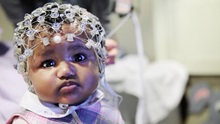Human Neuron Core
Mustafa Sahin, MD, PhD, Director
Elizabeth Buttermore, PhD, Associate Director
Lee Barrett, PhD, Assistant Director, Assay Development and Screening Facility
Cidi Chen, PhD, Assistant Director, CRISPR (Services coming in 2022)
Nina Makhortova, MD, PhD, Assistant Director, Phenotyping Services
Dosh Whye, MS, Assistant Director, Differentiation Services
The Human Neuron Core at Boston Children’s Hospital offers a new paradigm for disease modeling and preclinical drug screening informed by broad expertise at Harvard in neuroscience, neurology and stem cell biology. Generous funding from the Massachusetts Life Sciences Center has enabled us to significantly expand our equipment and services and open them to the broader research community. The Core offers transformative stem cell technology for both modeling of specific diseases and screening of test compounds in human neurons derived from induced pluripotent stem cells (iPSCs).
Services Offered:
- The Human Neuron Differentiation Service provides well-characterized human neurons to academic investigators and industry collaborators to support translational research programs. Cell types available include human neurons derived from induced pluripotent stem cell (iPSC) lines, including excitatory cortical neurons, GABAergic neurons, spinal motor neurons, and sensory neurons.
- The Human Neuron Phenotyping Service can compare key cellular characteristics across patient-derived and control-derived neurons. Phenotyping services include quantification of high content measures of neuronal morphology, neuronal excitability using multiple electrode array recordings and targeted RNA sequencing profiles (AmpliSeq) of neuronal transcriptomes. Equipment is also available for core users to run experiments independently.
- The expanded Assay Development Screening Facility provides multiple live-cell screening platforms that can assess image- and activity-based measures of live neurons hourly, in a medium/high-throughput capacity. Key equipment available for hourly use includes the Hamamatsu Functional Drug Screening System and the Molecular Devices IXM-C, a high content screening platform with live cell imaging and support from a range of robotics and liquid handlers to operationalize drug screening efforts.
- The Repository Core for Neurological Disorders is a Boston Children’s Hospital database and biological specimen bank that pairs biological samples with phenotypic data for translational research and clinical trials. To better understand causes and create new therapies for neurological disorders, it is often necessary for researchers to investigate various patients with the same or similar conditions. Therefore, such studies can benefit immensely from access to a database of high-quality clinical data paired with DNA and protein samples from affected individuals. This database and bio-specimen bank can save both time and resources that would be required to collect these data independently. As a result, all data, DNA and other bio-samples will be stored indefinitely and will potentially be used by multiple investigators for future studies of the causes and/or treatment of neurological disorders. The Core is anticipated to lead to new and enhanced collaborations among users, including collaborations between those who submit and those who access the data, between those who analyze the data with different primary goals, and between those using this and other Cores.
The Core Sample Application can be found here
Biomarkers Unit
Clinical Neurophysiology Research Core
April Levin, MD, Director

The core aims to become a leader in the acquisition and analysis of high-quality human neurophysiological data, specializing in the acquisition of EEG from infants, children and individuals with neurodevelopmental disorders. The Core occupies a purpose-built space at 2 Brookline Place outfitted with a high-density electrophysiology system that provides integration with stimulus presentation (for event related potentials) and eye tracking. The Core offers experimental design/grant consultation, acquisition of EEG from infants, children and adults and data analysis.
Services Offered:
- Neurophysiology Experimental Design/Consultation
- Neurophysiology Study Start Up (coding paradigms, optimizing equipment)
- High-density EEG Acquisition (MagStim EGI Geodesic High Density EEG System)
- Equipment Use (EGI EEG System, Physio16 Physiological Measurement Hardware, Presentation Software, EyeLink Eye Tracker, Emblettea MPR PSG System-XD)
- EEG Data Analysis
Animal Behavior and Physiology Core
Michela Fagiolini, MD and Alexander Rotenberg, MD, PhD, Co-Directors
In parallel, through a collaboration with the IDDRC Animal Behavioral and Physiology core, the Unit has the capability of recording long-term, wireless video-EEG from 20 mice simultaneously for the assessment of genetic or pharmacological manipulations on neural activity. To parallel the clinical methodologies, rodent EEG can be combined with stimulus presentation and TMS experimental designs. The Unit also provides consultation regarding trial design, rationale for a neurophysiology measure relevant to target disorder or developmental process, assessment of data-acquisition needs including contextual review of the literature and current competitive efforts elsewhere, identification of research collaborators, and recommended software or platform for processing.
The unit serves as a conduit to the Small Animal Imaging Laboratory and the Research Imaging Core, led by Dr. Simon Warfield for imaging-based biomarker acquisition.